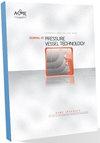P91焊接管道在高温弯矩和扭矩作用下的蠕变疲劳寿命特性
IF 1.4
4区 工程技术
Q4 ENGINEERING, MECHANICAL
Journal of Pressure Vessel Technology-Transactions of the Asme
Pub Date : 2023-07-20
DOI:10.1115/1.4062973
引用次数: 0
摘要
近年来,由于可再生能源的能源输出波动,火力发电厂的作用已从提供基本负荷转变为提供补充供应。因此,预计这些装置的运行涉及频繁的启动和关闭循环,这会导致蠕变和疲劳相互作用造成的广泛损坏。此外,火力发电厂中使用的管道受到由弯矩和扭矩组成的组合应力状态。在这项研究中,开发了一种能够产生这种弯扭载荷的高温疲劳试验机。对带焊件的P91钢管进行了蠕变疲劳试验。所得结果表明,扭转力矩和弯曲力矩的叠加降低了蠕变疲劳寿命,而保持载荷则进一步降低了蠕变寿命。研究还表明,用改进的延性耗尽规律可以准确地估计管道焊缝的蠕变疲劳寿命。本文章由计算机程序翻译,如有差异,请以英文原文为准。
Creep-Fatigue Life Property Of P91 Welded Piping Subjected To Bending And Torsional Moments At High Temperature
In recent years, the role of thermal power plants has shifted from providing a baseload to providing supplemental supply due to fluctuations in the energy output of renewable energy sources. Thus, it is expected that the operation of these plants involves frequent startup and shutdown cycles, which lead to extensive damage caused by creep and fatigue interactions. In addition, the piping utilized in thermal plants is subjected to a combined stress state composed of bending and torsional moments. In this study, a high-temperature fatigue testing machine that is capable of generating such a bending-torsional loading was developed. Creep-fatigue tests were conducted on P91 steel piping with weldment. The obtained results clarified that the creep-fatigue life was reduced by the superposition of the torsional and bending moments and that it was further reduced by a holding load. It was also shown that the creep-fatigue life of piping welds can be estimated accurately by the modified ductile exhaustion rule.
求助全文
通过发布文献求助,成功后即可免费获取论文全文。
去求助
来源期刊
CiteScore
2.10
自引率
10.00%
发文量
77
审稿时长
4.2 months
期刊介绍:
The Journal of Pressure Vessel Technology is the premier publication for the highest-quality research and interpretive reports on the design, analysis, materials, fabrication, construction, inspection, operation, and failure prevention of pressure vessels, piping, pipelines, power and heating boilers, heat exchangers, reaction vessels, pumps, valves, and other pressure and temperature-bearing components, as well as the nondestructive evaluation of critical components in mechanical engineering applications. Not only does the Journal cover all topics dealing with the design and analysis of pressure vessels, piping, and components, but it also contains discussions of their related codes and standards.
Applicable pressure technology areas of interest include: Dynamic and seismic analysis; Equipment qualification; Fabrication; Welding processes and integrity; Operation of vessels and piping; Fatigue and fracture prediction; Finite and boundary element methods; Fluid-structure interaction; High pressure engineering; Elevated temperature analysis and design; Inelastic analysis; Life extension; Lifeline earthquake engineering; PVP materials and their property databases; NDE; safety and reliability; Verification and qualification of software.

 求助内容:
求助内容: 应助结果提醒方式:
应助结果提醒方式:


